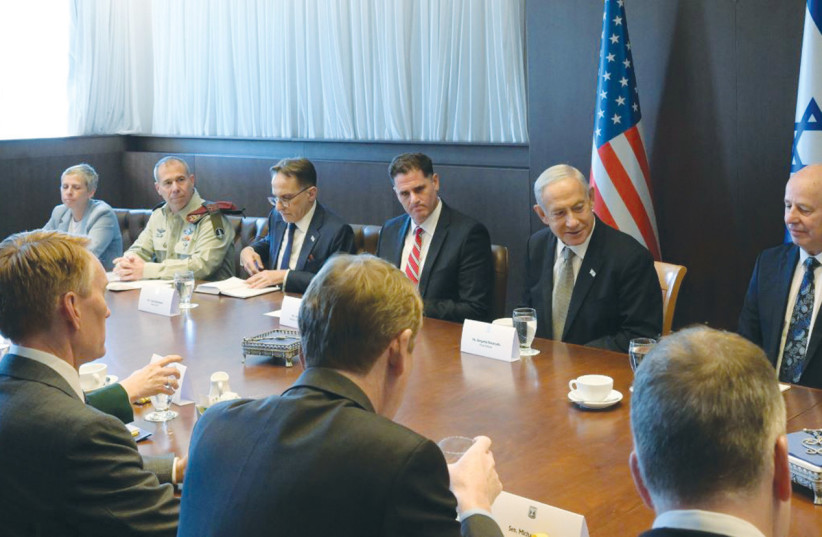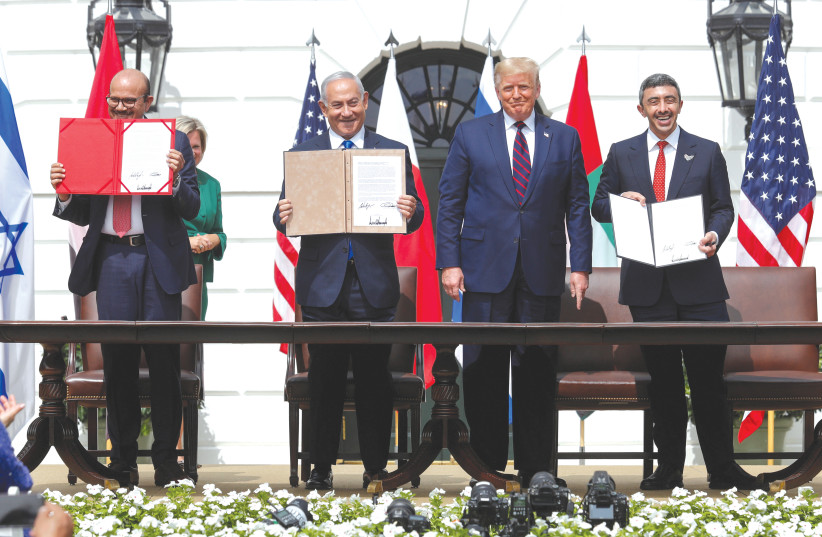Integration of the Middle East as a group of countries in a region is important, including sovereign states with a “shared and common interest,” Saudi Arabian Ambassador to the US Princess Reema bint Bandar Al Saud recently told the Jewish Insider news site. “Integration means our people collaborate, our businesses collaborate, and our youth thrive.”
Her comments were made at the Aspen Ideas Festival. On the one hand, although she didn’t mention Israel, this can serve as an example of how mainstream the discussion of Israel-Saudi ties has become, appearing to be in a constant spotlight these days. As such, normalization has been put on a pedestal, and every small incident in Israel, or the Gulf or the US is then tied to it.
This focus can create a potentially problematic linkage, however, because it requires a response on every occasion to see whether the latest news may reduce or improve the chances for normalization. It also has the unintended consequence of sometimes appearing to strain ties or create illusions of tensions.
Saudi Arabia, for instance, has expressed concern over recent violence in the West Bank. With the spotlight on potential ties, every clash necessarily becomes a potential setback.
While both Saudi Arabia and Israel are interested in normalization, and both want the US to play a role in it, the current clashes in the West Bank are akin to a fire burning in their backyard, US Secretary of State Antony Blinken recently told the Council on Foreign Relations.
“It’s going to be a lot tougher, if not impossible, to both deepen the existing agreements as well as to expand them to include, potentially, Saudi Arabia,” he said.

Linking Saudi normalization with a prerequisite of peace
The linkage of peace with Riyadh to West Bank incidents is reminiscent of a previous era in 2016, when then-secretary of state John Kerry said: “There will be no advance and separate peace with the Arab world without the Palestinian process and Palestinian peace… Everybody needs to understand that. That is a hard reality.”
This linkage of normalization with issues in the West Bank has a long history. Kerry’s comments were part of the larger milieu of accepted truths, which posited that Israel’s “right-wing” government was preventing peace – because the lack of a two-state solution meant there couldn’t be peace.
After the Six Day War in 1967, Israel was encouraged to trade “land for peace,” a paradigm that led all the way to the Oslo Accords. Those agreements were constructed in such a way that “final status” issues would make a two-state solution and final peace impossible – because the people who framed the agreements knew that Palestinian refugees would never actually return. They also knew that Jerusalem would never be divided and that most Jewish communities in the West Bank would never be evacuated.
Israel was told it couldn’t achieve peace unless it withdrew to the original 1967 lines, birthing an impossible situation. As well, the prospect of peace with the Gulf states was held up as a kind of scheme, using the lack of peace as a pressure point for Israel.
This might make Israel the only country where a lack of a peace deal on one issue is used to prevent diplomatic ties, something that is usually seen as quite basic, even among countries that don’t get along. For example, the Pakistan-India conflict that emerged in 1948, the same time as Israel’s War of Independence, was not held up as a reason for India or Pakistan not to have relations with other countries.
There is also no evidence that lack of normalization actually helped achieve peace. Had all the Arab states normalized relations with Israel in 1949, the Six Day War may never have happened, and there would be no “occupation” of the West Bank. Instead, lack of ties fueled the conflict.
In 2020, the Abraham Accords were signed, proving both durable and important. Countries are now realizing how essential they are for the region and the world at large. The US House of Representatives recently passed a bipartisan bill to create an envoy for the Abraham Accords. US Air Force Lt. Gen. Alexus Grynkewich, commander of the Ninth Air Force and the Combined Forces Air Component Commander for US Central Command, Southwest Asia, last week said Central Command was focusing on the integration of regional air and missile defense in the Middle East.
A Middle East Air Defense group is part of that integration and the creation of stability. These are the incremental blocks that help form the basis for potential Israel-Saudi ties.

Now, let’s contrast the positive steps – the Abraham Accords envoy, regional air defenses and growing trade between Israel and the Gulf states – with the challenges. There was a link between Riyadh wanting a civilian nuclear program and normalization with Israel, according to a New York Times article two weeks ago. But that wasn’t the only hurdle, the article said. The Saudis also want a defense pact and fewer restrictions on US arms sales.
Other issues are in play as well: Iran-Saudi ties were brokered by China, and questions have risen about the US’s long-term commitment to the region. Do Saudi-Iran ties reduce the chances of Israel-Saudi ties? Do China’s inroads change the calculus?
Riyadh has consistently said its position on the Israeli-Palestinian conflict hasn’t officially changed. It backed the Arab Peace Initiative in 2002, a plan that called for peace in return for a just and comprehensive peace with the Palestinians based on a two-state solution.
It is clear that there is a lot of focus on potential ties, which is helped by constant spotlight on the issue by US National Security Advisor Jake Sullivan, who discussed normalization in May. In April, US Sen. Lindsey Graham (R-South Carolina) told reporters in Jerusalem an opportunity for normalization could end in 2024.
Sometimes, the hurdles of normalization work like a feedback loop of diminishing returns, such as placing a stumbling block where none existed before. It goes something like this: “Normalization could happen, however, the election of a right-wing government is a setback. Normalization could happen, but first there must be comprehensive peace, and the right-wing government makes that harder.”
Additionally, while normalization could happen, West Bank clashes make it more difficult. Also making it difficult are China’s inroads in the region and Iran’s moves. Furthermore, we would need an American commitment to “civilian nuclear power” to make it happen... and so on and so forth.
The last six months saw near-daily discussions about normalization, which gives the sense of a very close, known quantity of time. Yet at the same time, it seems like a Gordian knot, in large part because increased focus leads to increased controversies.
Actors that may seek to spoil normalization can also have more leverage, such as Iranian-backed terrorist groups, including Islamic Jihad’s operatives in Jenin. With one operation, they think they can derail a deal that could be worth billions of dollars in trade and help knit together a corridor of stability stretching from Greece to India.
This is unreasonable, and as such, it is worth keeping an eye on the larger picture. Integration of the region is growing, and momentum is building. Riyadh has its timetable for potential normalization.
